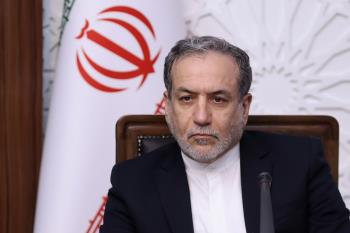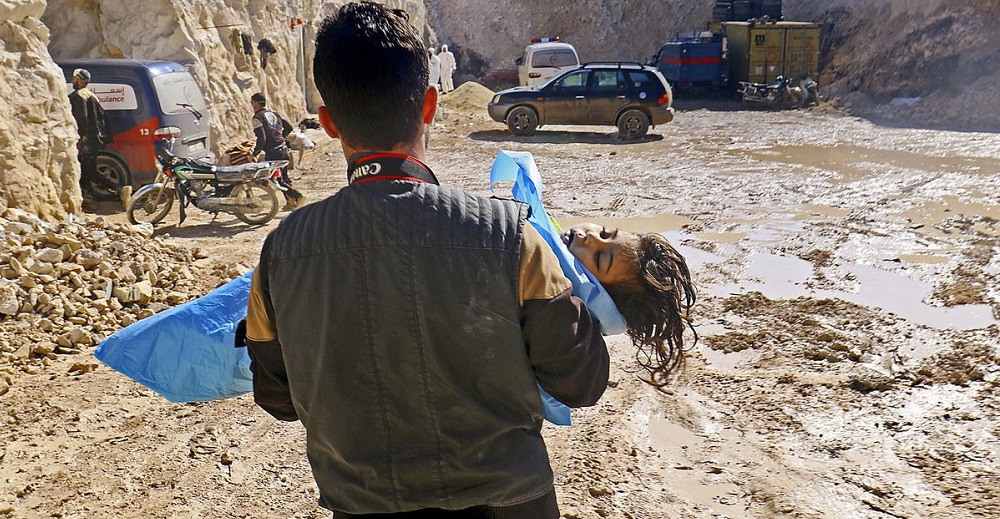Alwaght- The chemical attacks are the most terrible part of any war of the modern times, with the civilians, rather than the military personnel, being their major victims. The international community so far agreed a series of conventions and laws criminalizing use of the chemical arms, however, the modern conflicts still witness application of them.
The very clear example is the Syrian conflict. As the war goes on, several reports appeared to talk about use of chemical material by the terrorists and anti-government militants, but the international organizations failed to proportionately address the cases. But the latest use of toxic material in Khan Sheikhoun in northwestern province of Idlib proved to have a different story in terms of the poisonous material's circulation, the global reactions, and propagandistic use of the incident by media.
On April 4, the Western media fast circulated a report about the Syrian army’s use of toxic agents in an attack on Khan Sheikhoun town. Very soon, many Western leaders pointed the finger of blame at the Syrian government, with their accusations being devoid of any authentic evidence. A huge wave of media propaganda accusing Damascus of inhuman assault on Khan Sheikhoun ensued. The blames were directed against the government while a probe into the issue was yet to be launched.
The Russian government argued that the Syrian government was not responsible for any chemical attack, rather the deaths came after the Syrian government’s planes targeted terrorists' ammunition depository that also contained chemical material, and that the toxic agents' circulation in the air caused the casualties. The Damascus officials confirmed the Moscow account.
However, the Russian and Syrian reasoning failed to convince the Western leaders to halt their persistent accusations. The US shortly after responded to the attack. The US President Donald Trump only three days later ordered launching missile strikes against Syria's Shayrat air base, a military site playing crucial role in conducting anti-terror air raids. The Trump administration failed to ask for authorization from the Congress which is constitutionally necessary for such military actions.
The hasty reaction of the West to the incident without waiting for an inquiry to see who was really accountable gave rise to the notion that the incident had been made up to weaken the Syrian government and uplift morale of its losing opponents on the ground using the media propaganda.
A couple of points can give enlightenment on what happened:
1. Two months after the Khan Sheikhoun incident, the Syrian government and allies still insist that the attack was not a work of the Syrian forces. On the opposite camp stand the Western governments blame the gas attack on Syria but do not allow a probe to be launched for enlightenment. This is against the Syrian and Russian pressures for a transparent chemical weapons investigation.
A recent UN truth commission has found that sarin agent has been observed in samples from the attack site. The report, however, declined to label culprit any side of the confrontation. The Western anti-Damascus accusations majorly stem from the idea that Syria should be held accountable because it in the past had chemical weapons. This comes while Damascus delivered its chemical arsenal totally to the Organization for Prohibition of Chemical Weapons until 2014 in accordance with the United Nations Security Council's resolution 2118. The OPCW at the end of delivery process in an official report to the UN confirmed that the Syrian government no longer stockpiled any chemical weapons.
Despite this international confirmation, the Western sides still struggle for an anti-Syrian UN bill, without allowing a valid probe.
These attempts are faced by Moscow reaction. The Russian Foreign Minister Sergey Lavrov criticized the three countries of the US, France, and Britain for systematically evading an agreement on a UN investigation. The Syrian President Basher al-Assad, too, strongly condemned Khan Sheikhoun incident as West's “fabrication.”
2. The Syrian crisis saw several times use of toxic gas by the terrorists. Before Khan Sheikhoun tragedy, the Syrian government delivered to Russia evidences of the terrorists' use of chemicals, only to be disregarded by the responsible international organizations. But the latest attack unleashed a storm of media propaganda and diplomatic reactions against Syria and its backers.
A question rises here: who should be held responsible for chemical material supplying if a potential probe finds that the terrorists in Khan Sheikhoun held the toxic agents? The West or the terrorists' regional supporters, or the international organizations that turned a blind eye to the Syrian government's reports? The West's treatment of the case is enough to recognize the Western double standards in dealing with the humanitarian issues.
3. Relying on self-conclusion and without any results of any investigation, the US toughly responded to the incident. The missile raid on the strategic Shayrat air base was the initial Washington reaction. Now if significance of the air base, one of the five key sites for bombing the terrorist positions, is taken into consideration, it can be concluded that some military intentions, backed by huge media misleading campaign, were drives of the accusations, and that Syrian civilians were brought into play instrumentally to serve the Western military agenda.
4. In addition to blaming the Syrian government, the Western actors label the pro-Damascus Axis of Resistance as accomplice. The German officials' criticism of Iran and Russia for standing by Syria makes it clear that a full circle of Damascus patrons is subjected to the Western-directed political game.
5. The media coverage of the incident was almost unique. Upon its taking place, the mainstream news networks like CNN, BBC, and Aljazeera massively covered the development, a reporting campaign that majorly reflected the Western narrative of the happening. A Russian official on May 18 told the media in a press conference that videos of Khan Sheikhoun chemical attack may just be “US propaganda.” Maria Zakharova, Russian foreign ministry spokeswoman, said: “we have paid attention to the video which has recently been published in the mass media with a mercenary from the Syrian armed military opposition forces who claimed that the chemical incident in Syria’s Khan Sheikhoun on April 4 has been staged. He confirmed that the chemical attack had been staged in order to discredit the Syrian government on the eve of Russia-US meetings.”
Aside from the extent of veracity of these remarks, the theory of fabrication of the incident is gaining further weight as the time goes by. So clearly the Khan Sheikhoun civilians fell victim to large-scale Western propaganda campaign against the Resistance camp to cover the failures.



























